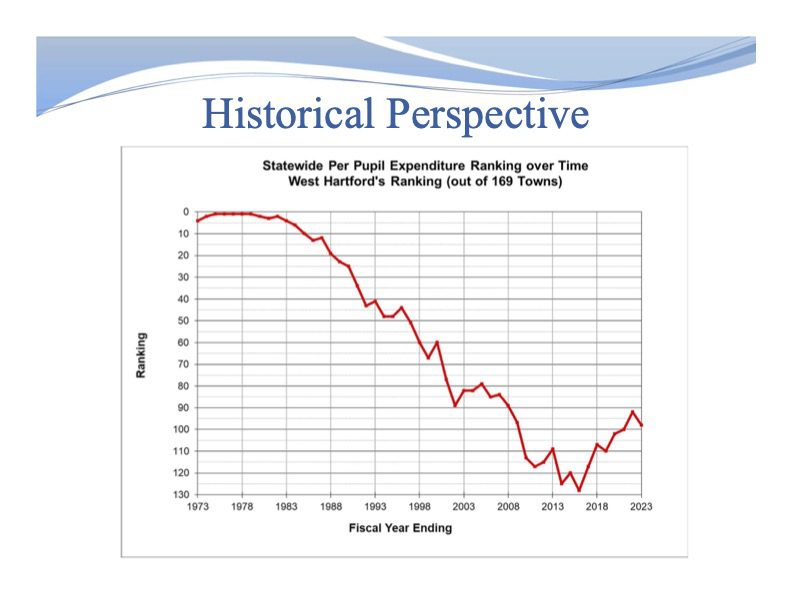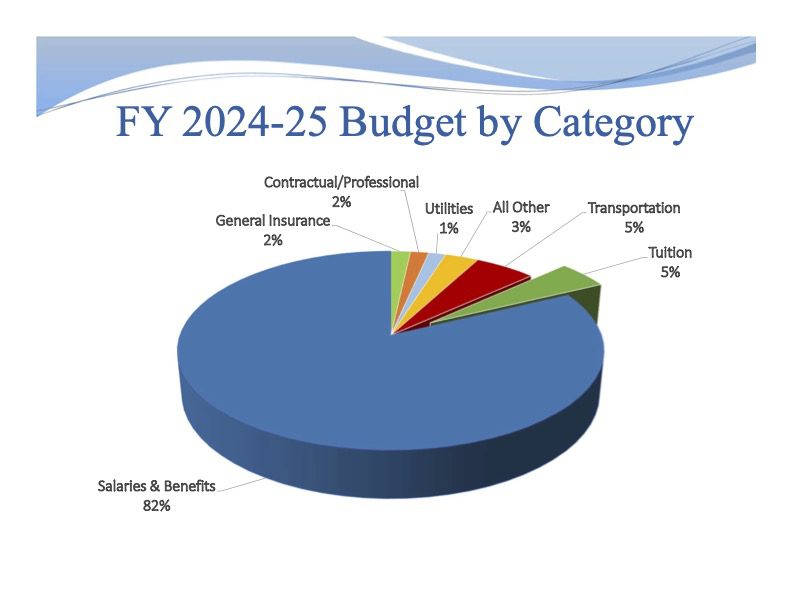West Hartford Superintendent Presents $201.3 Million Budget for 2024-2025 Academic Year

Audio By Carbonatix

Courtesy of West Hartford Public Schools
Superintendent Paul Vicinus’ proposed budget for the West Hartford Public Schools’ 2024-2025 academic year includes an $11.1 million (5.8%) overall increase with special education costs, including tuition, salaries, and medial expenses as major drivers.
By Ronni Newton
The West Hartford Board of Education received the proposed 2024-2025 budget from Superintendent Paul Vicinus on Tuesday night, the first official step in the process that actually began when the school year started, and which will lead to the adoption of the budget on Thursday, April 4.
The proposed $201,303,856 budget represents an overall increase of $11,112,735 (or 5.8%) more than the $190,191,121 budget adopted for the 2023-2024 academic year.
“As a Board of Education, this is likely one of the most critical responsibilities that you have,” Vicinus said Tuesday as he outlined his proposal, noting three overriding themes that are significant factors – the increase in special populations and their programming needs, the challenges caused by unfunded state mandates, “and what I hope you’ll hear most of all is the return on investment of educational services.”
This year’s budget takes into account changes in enrollment, and recommends a restructuring of the administration of the town’s elementary schools and contraction of department supervisor roles in the secondary schools. It recommends an overall net staff reduction of 10.6 full-time equivalent (FTE) positions from the general fund budget. ESSER (the Elementary and Secondary School Emergency Relief grants), which supported 21.5 staff members with funds that were outside of the district’s general fund budget, sunsets as of the upcoming academic year.
Modifications to the roll forward budget “included analysis and determination of whether ESSER funded positions need to be preserved,” Vicinus stated in his executive summary, and some of those positions have been retained and are now included in the general fund budget. Positions that were funded by ESSER and will be continued include a teacher of the deaf and additional staff on the special education team. The 7.8 FTE elementary counselors that were funded by ESSER are not being specifically funded in the proposed budget.
While preparing a budget is always challenging, “the past several years have introduced challenges for schools never before imagined,” Vicinus said. He noted that this budget continues to reinforce the district’s goals that include achieving advancement for all students while reducing disparities, nurturing “the intellectual, physical and emotional well-being of students” while creating “a safe and respectful learning community where all students are held to high expectations,” and attracting, retaining, and developing high quality staff.
The roll-forward budget – looking at keeping the exact same programs and services and the exact same number of people next year as this year – would result in a $11.35 million (6.0%) increase, driven by salary increases that are part of negotiated collective bargaining agreements, additional staffing to meet student needs, and an increase in medical expenses.
Vicinus made adjustments that net a total reduction of $237,991 to the roll-forward budget – but he said some of the drivers are unavoidable – most notably an increase in out-of-district placement tuition expenses of $1,533,622 (20% increase). West Hartford has been able to bring 32 students that were previously out-placed back into the district, Vicinus said, but tuition rates are increasing and there is a significant shortfall in the state reimbursement for tuition. The reimbursement is supposed to kick in once tuition costs exceed 4.5 times the district’s per pupil cost, but last year was only funded at a rate of 70% of those excess costs.
The proposed administrative restructuring nets a small reduction ($48,184) in the budget, but the intent is to better address needs at all levels.
Currently there are 11 curriculum specialist positions in the elementary schools, and Vicinus is proposing eliminating those positions and replacing them with assistant principals “to provide support in managing administrative issues, discipline, and building based oversight of special education and 504 processes and service delivery models,” he wrote in his executive summary of the budget. Vicinus said Tuesday night that most of the current curriculum specialists would be eligible to apply for the assistant principal positions. The intent of the change is to truly enable to elementary principals to position themselves as “key instructional leaders in the district.”
The other significant structural change that Vicinus is recommending is reduction of supervisors from two to one in the secondary school science, social studies, and world language departments. He is recommending an assistant director in pupil services, “to more effectively manage the evolving needs of social education students, families, and staff,” but that would be offset by the reduction in a pupil services department supervisor position.
As he presented the budget, Vicinus also provided a historical perspective and outline of what makes West Hartford Public Schools unique as well as what continues to drive budget costs.
Who are we?
Enrollment has actually increased since the official report of 9,155 students last fall, Vicinus said. And, he added, “They come to use with varied experiences, varied strengths, and needs.”
The number of students who qualify as “English language learners” continues to increase, and is now just under 800 – a roughly 13% increase, Vicinus said.
The number of students qualifying for free or reduced lunch is up 7%, and this year there are 182 more students who receive special education services, “reflecting a need for continued investment” to be able to provide the legally- and morally-required services.

West Hartford Public Schools budget presentation
What we do?
The district as a whole, schools, and individual students have received recognition locally and nationally. “We have incredible services that reach every child,” said Vicinus, highlighting a list of accolades from this year alone that include being featured by Edutopia for early childhood education, a Blue Ribbon elementary school and other schools of distinction, a middle school literary competition winning team that is heading to Australia for international competition, a student author, Gold Medal performance in the Advanced Placement program, honors for Unified Soccer in the Special Olympics, many awards by student in the fine and performing arts, and championships on the state and regional level by scholar-athletes.
How do we do it?
“We do it with relative efficiency,” said Vicinus.
During 1970s and 1980s West Hartford was among the top districts in the state in terms of per pupil expenditure. In 2015, the district was in the lowest 10% in terms of per pupil spending statewide. Last year the district was 98th out of 169, which “puts us just above the lowest third in terms of per pupil expenditure,” said Vicinus, but at the same time students consistently scored in the top third on state assessments.

West Hartford Public Schools budget presentation
If West Hartford’s per pupil expenditure was at the state media, it would add $8.3 million to the budget, and if it was at the average of the DRG B (the district reference group that includes Farmington Valley towns as well as Greenwich, Trumbull, Newtown, Cheshire, and others), the budget would be $6.3 million higher. While economics of scale come into play, Vicinus said spending at the average of districts in the state with at least 5,000 students would cost $3.2 million more.
In addition, he noted that from a consumer perspective based on in-state tuition costs, West Hartford families have saved $2.4 million in college course credits by participating in the AP and Early College Experience (ECE) programs in the high schools.
“We know that we’re successful, we know that we’re creating great value … our secret is really in that giant blue piece of the pie,” said Vicinus.

West Hartford Public Schools budget presentation
Salary and benefits, as 82% of the West Hartford Public Schools budget, represents the work that educators and support staff “do and give every day for every child. … We are a people organization,” Vicinus said.
Worth noting, he added, is that tuition has gone from 4% to 5% of the budget, general insurance has increased from 1% to 2% of the budget, and utilities (down from 2% to 1%) and transportation (down from 6% to 5% in the second year of a contract) – all slightly different size slices of the pie.
While it won’t show up in the West Hartford Public School’s budget, Vicinus also noted that in light of the sunsetting of the ESSER funds, the state has accelerated Educational Cost Sharing (ECS) grant funding under Gov. Ned Lamont’s proposed budget for Fiscal Year 2025. Those funds are part of the town’s overall General Fund budget, and add $2,051,504 to the bottom line. If ECS could be shown in the district’s budget, the proposed budget increase would drop to 4.8%, Vicinus said.
“It is a difficult time of year,” Vicinus said Tuesday. He said the requested increase is fairly in-line with the average of 5.5% requested increase by DRG districts that have reported their budgets thus far.
“We have really done a lot of work to scrutinize what is there,” said Vicinus, adding that the budget is what he feels is “really necessary to run our schools.” Specific items will be unpacked and discussed in detail during upcoming budget workshops.
While the Board of Education decides what to spend, it is ultimately up to the Town Council to allocate the funding. The Council, however, cannot alter specific line items but only the overall district budget.
Upcoming public meetings related to the Board of Education budget include:
- Budget Workshop No. 1, Wednesday, March 13, 7 p.m.
- Board Public Hearing, Wednesday, March 27, 7 p.m.
- Budget Workshop No. 2, Wednesday, March 27, following Public Hearing
- Board Budget Adoption, Thursday, April 4, 7 p.m.
- Town Council Budget Adoption, Wednesday, April 24, 7 p.m.
The detailed budget is available on the West Hartford Public Schools website. Suggestions can be sent to [email protected].
Town Manager Rick Ledwith will be proposing the town’s overall Fiscal Year 2024-2025 budget on Tuesday, March 12. That meeting will begin at 7:30 p.m.
Like what you see here? Click here to subscribe to We-Ha’s newsletter so you’ll always be in the know about what’s happening in West Hartford! Click the blue button below to become a supporter of We-Ha.com and our efforts to continue producing quality journalism.




[…] last week was the presentation of the superintendent’s budget for the upcoming academic […]
[…] are projected to increase by $6,759,788 (5.42%), and Board of Education expenses, based on the proposal delivered by Superintendent of Schools Paul Vicinus on March 5, are estimated to increase $11,112,735 (5.84%). Capital financing costs are estimated to increase […]
[…] Superintendent of Schools Paul Vicinus proposed the budget for the 2024-2025 school year on March 5 – a $201,303,856 budget that represents an overall increase of $11,112,735 (or 5.8%) over the current year’s budget. Federal funds provided to the district in response to the pandemic – roughly $9.7 million in ESSER (the Elementary and Secondary School Emergency Relief grants) – had supported various programs as well as the hiring of additional staff with funds that were outside of the district’s general fund budget and ESSER funding sunsets as of the upcoming academic year. […]
[…] of comments from the community, the West Hartford Board of Education made some amendments to the initial budget proposal presented March 5 by Superintendent Paul Vicinus. In the end, the role of family and community engagement coordinator – a home-school liaison role […]